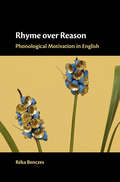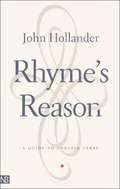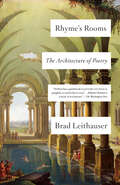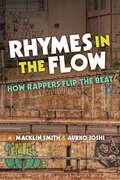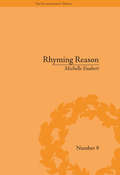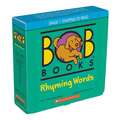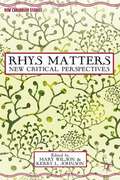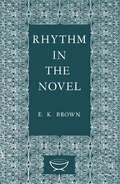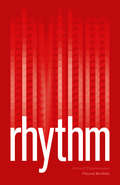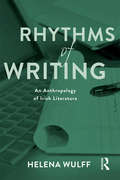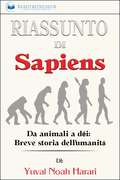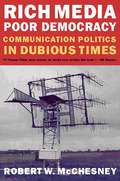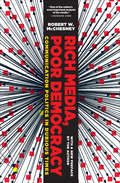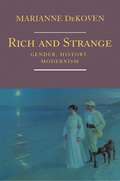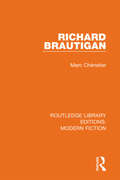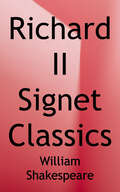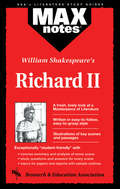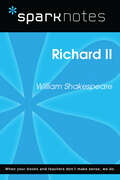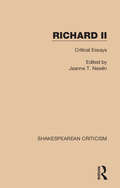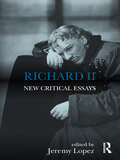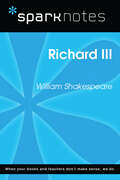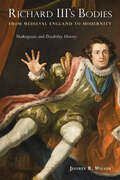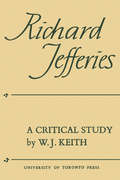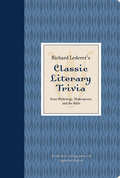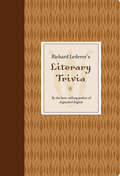- Table View
- List View
Rhyme over Reason: Phonological Motivation in English
by Réka BenczesWe are fascinated by what words sound like. This fascination also drives us to search for meaning in sound - thereby contradicting the principle of the arbitrariness of the linguistic sign. Phonesthemes, onomatopoeia or rhyming compounds all share the property of carrying meaning by virtue of what they sound like, simply because language users establish an association between form and meaning. By drawing on a wide array of examples, ranging from conventionalized words and expressions to brand names and slogans, this book offers a comprehensive account of the role that sound symbolism and rhyme/alliteration plays in English, and by doing so, advocates a more relaxed view of the category 'morpheme' that is able to incorporate less regular word-formation processes.
Rhyme's Reason: A Guide to English Verse (3rd edition)
by John HollanderIn his classic text, Rhyme's Reason, the distinguished poet and critic John Hollander surveys the schemes, patterns, and forms of English verse, illustrating each variation with an original and witty self-descriptive example.
Rhyme's Rooms: The Architecture of Poetry
by Brad LeithauserFrom the widely acclaimed poet, novelist, critic, and scholar, a lucid and edifying exploration of the building blocks of poetry and how they've been used over the centuries to assemble the most imperishable poems.&“Anyone wanting to learn how to remodel, restore, or build a poem from the foundation up, will find this room-by-room guide on the architecture of poetry a warm companion.&” —Tomás Q. Morín, author of MacheteWe treasure our greatest poetry, Brad Leithauser reminds us in these pages, "not for its what but its how." In chapters on everything from iambic pentameter to how stanzas are put together to "rhyme and the way we really talk," Leithauser takes a deep dive into that how—the very architecture of poetry. He explains how meter and rhyme work in fruitful opposition ("Meter is prospective; rhyme is retrospective"); how the weirdnesses of spelling in English are a boon to the poet; why an off rhyme will often succeed where a perfect rhyme would not; why Shakespeare and Frost can sound so similar, despite the centuries separating them. And Leithauser is just as likely to invoke Cole Porter, Stephen Sondheim, or Boz Scaggs as he is Chaucer or Milton, Bishop or Swenson, providing enlightening play-by-plays of their memorable lines.Here is both an indispensable learning tool and a delightful journey into the art of the poem—a chance for new poets and readers of poetry to grasp the fundamentals, and for experienced poets and readers to rediscover excellent works in all their fascinating detail.Portions of this book have appeared in The New Yorker, The New York Times, and The New York Review of Books.
Rhymes in the Flow: How Rappers Flip the Beat
by Macklin Smith Aurko JoshiDespite its global popularity, rap has received little scholarly attention in terms of its poetic features. Rhymes in the Flow systematically analyzes the poetics (rap beats, rhythms, rhymes, verse and song structures) of many notable rap songs to provide new insights on rap artistry and performance. Defining and describing the features of what rappers commonly call flow, the authors establish a theory of the rap line as they trace rap’s deepest roots and stylistic evolution—from Anglo-Saxon poetry to Lil Wayne—and contextualize its complex poetics. Rhymes in the Flow helps explain rap’s wide appeal by focusing primarily on its rhythmic and thematic power, while also claiming its historical, cultural, musical, and poetic importance.
Rhyming Reason: The Poetry of Romantic-Era Psychologists (The Enlightenment World #9)
by Michelle FaubertDuring the Romantic era, psychology and literature enjoyed a fluid relationship. Faubert focuses on psychologist-poets who grew out of the literary-medical culture of the Scottish Enlightenment. They used poetry as an accessible form to communicate emerging psychological, cultural and moral ideas.
Rhyming Words: Stage 1, Starting To Read (Bob Books)
by Dana Sullivan Lynn Maslen KertellRhyming makes reading easier and more fun for kids that are just getting started. When rhyming words are included in a story, they make sounding out (decoding) easier. Kids have reading success sooner and faster, build confidence, and they have fun too. Bob Books Rhyming Words is a great next step after Bob Books Set 1. <p><P> Inside the box you'll find: <P>- 10 easy-to-read, hilarious small books, 12 pages each <P>- With mostly two and three letter words, Bob Books Rhyming Words is suitable for the very beginning reader <P>- Phonics based - words can be sounded out <P>- Our rhyming words have endings that are spelled the same (no rhyming kite with light) <P>- Rhyming words are interspersed throughout, so the story is told in a conversational tone <P>- For extra learning support, each book focuses on one short vowel. For example, Hen in the Den focuses on the EN family, but also includes eggs, nest and went for extra short-e practice <P>- 40 word-family puzzle cards for fun rhyming words games
Rhys Matters
by Mary Wilson Kerry L. JohnsonRhys Matters, the first collection of essays focusing on Rhys's writing in over twenty years, encounters her oeuvre from multiple disciplinary perspectives and appreciates the interventions in modernism, postcolonial studies, Caribbean studies, and women's and gender studies.
Rhythm in the Novel
by E. K. BrownThe Alexander Lectures for 1949-50. In his Preface, Professor Brown says, "Isolating a single element or group of elements in the novel, and considering it in unreal separation from all the other elements which it actually fuses, is artificial, but so is all criticism. The artificiality is justified if when one turns back from the criticism to the novels these appear more intelligible and more delightful. That is the test." Applying the test to Dr. Brown's present work, the method is more than justified by the results. they are titled: "Phrase, Character, Incident," "Expanding Symbols," "Interweaving Themes," and "Rhythm in E.M. Forster's A Passage to India."
Rhythm: Form & Dispossession
by Vincent BarlettaMore than the persistent beat of a song or the structural frame of poetry, rhythm is a deeply imbedded force that drives our world and is also a central component of the condition of human existence. It’s the pulse of the body, a power that orders matter, a strange and natural force that flows through us. Virginia Woolf describes it as a “wave in the mind” that carries us, something we can no more escape than we could stop our hearts from beating. Vincent Barletta explores rhythm through three historical moments, each addressing it as a phenomenon that transcends poetry, aesthetics, and even temporality. He reveals rhythm to be a power that holds us in place, dispossesses us, and shapes the foundations of our world. In these moments, Barletta encounters rhythm as a primordial and physical binding force that establishes order and form in the ancient world, as the anatomy of lived experience in early modern Europe, and as a subject of aesthetic and ethical questioning in the twentieth century. A wide-ranging book covering a period spanning two millennia and texts from over ten languages, Rhythm will expand the conversation around this complex and powerful phenomenon.
Rhythms of Writing: An Anthropology of Irish Literature
by Helena WulffThis is the first anthropological study of writers, writing and contemporary literary culture. Drawing on the flourishing literary scene in Ireland as the basis for her research, Helena Wulff explores the social world of contemporary Irish writers, examining fiction, novels, short stories as well as journalism. Discussing writers such as John Banville, Roddy Doyle, Colm Tóibín, Frank McCourt, Anne Enright, Deirdre Madden, Éilís Ní Dhuibhne, Colum McCann, David Park, and Joseph O´Connor, Wulff reveals how the making of a writer’s career is built on the ‘rhythms of writing’: long hours of writing in solitude alternate with public events such as book readings and media appearances. Destined to launch a new field of enquiry, Rhythms of Writing is essential reading for students and scholars in anthropology, literary studies, creative writing, cultural studies, and Irish studies.
Riassunto di Sapiens: Breve storia dell'umanità
by Readtrepreneur Publishing E. RossiCome abbiamo fatto ad arrivare a questo punto? Noi, l'Homo sapiens, governiamo il mondo perché siamo gli unici animali che credono nel potere dell'immaginazione. Il libro del dott. Yuval Noah Harari sui sapiens è un capolavoro, unico nel suo genere. Mentre altri libri si concentrano sulla parte storica o su quella biologica del nostro essere umani, "Sapiens" si concentra sulle tre grandi rivoluzioni della storia dell'uomo: quella cognitiva, quella agricola e quella scientifica. “Non c'è una sola cosa vera. Tutto è vero" – Yuval Noah Harari Il dott. Harari ora ci suggerisce di guardare avanti, perché le cose cambieranno. L'uomo ha rivoluzionato non solo il nostro mondo, ma anche noi stessi. Siamo cresciuti, siamo migliorati e ci siamo trasformati. E questa trasformazione non si fermerà. Dove ci porterà? Dove arriveremo, e cosa stiamo diventando? (Nota: Questo riassunto è stato completamente scritto e pubblicato da readtrepreneur.com e non è affiliato in alcun modo con l'autore originario) P.S. MIgliorate il vostro cervello evolutivo con questo libro pieno di saggezza e conoscenza. Rendetevi conto di quanto siete migliori di quello che pensate. Amerete questo libro... dopotutto, siete umani. Il tempo di pensare è finito! Ora è il momento dell'azione. Scorrete in alto e cliccate su "Compra ora con 1-Click”, per farvi mandare subito una copia! Perché scegliere Readtrepreneur? Riassunti di altissima qualità Nozioni formidabili Ottimo per memorizzare Chiaro e conciso Disclaimer: Questo libro è inteso come allegato del libro originale, o per averne solo un'idea. Se state cercando il libro originale, andate qui: http://ul1.it/sapiens/
Rich Media, Poor Democracy: Communication Politics in Dubious Times
by Robert W. McchesneyIn this myth-breaking book, McChesney argues that the media, far from providing a bedrock for freedom and democracy, have become a significant anti-democratic force in the United States and, to varying degrees, worldwide.
Rich Media, Poor Democracy: Communication Politics in Dubious Times (The\history Of Communication Ser.)
by Robert W. McChesneyAn updated edition of the &“penetrating study&” examining how the current state of mass media puts our democracy at risk (Noam Chomsky). What happens when a few conglomerates dominate all major aspects of mass media, from newspapers and magazines to radio and broadcast television? After all the hype about the democratizing power of the internet, is this new technology living up to its promise? Since the publication of this prescient work, which won Harvard&’s Goldsmith Book Prize and the Kappa Tau Alpha Research Award, the concentration of media power and the resultant &“hypercommercialization of media&” has only intensified. Robert McChesney lays out his vision for what a truly democratic society might look like, offering compelling suggestions for how the media can be reformed as part of a broader program of democratic renewal. Rich Media, Poor Democracy remains as vital and insightful as ever and continues to serve as an important resource for researchers, students, and anyone who has a stake in the transformation of our digital commons. This new edition includes a major new preface by McChesney, where he offers both a history of the transformation in media since the book first appeared; a sweeping account of the organized efforts to reform the media system; and the ongoing threats to our democracy as journalism has continued its sharp decline. &“Those who want to know about the relationship of media and democracy must read this book.&” —Neil Postman &“If Thomas Paine were around, he would have written this book.&” —Bill Moyers
Rich and Strange: Gender, History, Modernism
by Marianne DeKovenLike the products of the "sea-change" described in Ariel's song in The Tempest, modernist writing is "rich and strange." Its greatness lies in its density and its dislocations, which have until now been viewed as a repudiation of and an alternative to the cultural implications of turn-of-the-century political radicalism. Marianne DeKoven argues powerfully to the contrary, maintaining that modernist form evolved precisely as a means of representing the terrifying appeal of movements such as socialism and feminism. Organized around pairs and groups of female-and male-signed texts, the book reveals the gender-inflected ambivalence of modernist writers. Male modernists, desiring utter change, nevertheless feared the loss of hegemony it might entail, while female modernists feared punishment for desiring such change. With water imagery as a focus throughout, DeKoven provides extensive new readings of canonical modernist texts and of works in the feminist and African-American canons not previously considered modernist. Building on insights of Luce Irigaray, Klaus Theweleit, and Jacques Derrida, she finds in modernism a paradigm of unresolved contradiction that enacts in the realm of form an alternative to patriarchal gender relations.
Richard Brautigan (Routledge Library Editions: Modern Fiction)
by Marc ChénetierFew contemporary American writers have been subjected to as much laudatory abuse as Richard Brautigan who, having become famous in the 1960s, was made a cult figure for the hippy generation and was systematically refused recognition as a major novelist once the sentimental wave of the ‘greening of America’ had passed. Marc Chénetier’s study, originally published in 1983, was the first book to attempt to assess Brautigan’s writing art which, far from weakening over the years, had become, amid critical indifference, more secure in its techniques, more all-encompassing in its strategy and more iconoclastic in its goals. In analysing most of Brautigan’s fictional works in the light of his poetics, it examines the mechanisms of his metafictional and deconstructive offensive and indicates the direction in which Brautigan was moving at the time.
Richard II
by William ShakespeareThis newly revised Signet Classic edition of Richard II features an extensive overview of Shakespeare's life, world and theatre, a special introduction to the play, notes on the text, dramatic criticism from the past and present and an up-to-date list of recommended readings.
Richard II (MAXnotes Literature Guides)
by Michael MorrisonREA's MAXnotes for William Shakespeare's Richard II The MAXnotes offers a comprehensive summary and analysis of Richard II and a biography of William Shakespeare. Places the events of the play in historical context and discusses each act in detail. Includes study questions and answers along with topics for papers and sample outlines.
Richard II (SparkNotes Literature Guide Series)
by SparkNotesRichard II (SparkNotes Literature Guide) by William Shakespeare Making the reading experience fun! Created by Harvard students for students everywhere, SparkNotes is a new breed of study guide: smarter, better, faster. Geared to what today's students need to know, SparkNotes provides: *Chapter-by-chapter analysis *Explanations of key themes, motifs, and symbols *A review quiz and essay topicsLively and accessible, these guides are perfect for late-night studying and writing papers
Richard II: Critical Essays (Shakespearean Criticism)
by Jeanne T. NewlinOriginally published in 1984. The four parts of this collection of articles, from 1601 to the 1970s, look at the historical and political dynamics of the play, the play in the theatre, the psychology of its characters, and its poetry and rhetoric. Bringing together the best that was written about Richard II, this volume represents the collective wisdom of Shakespeare scholars and provides the most insightful criticism in one place. An unpopular play for many years due to the perceived weak main character and the theme of deposition, the play later gained popularity and interest in its psychology and political investigation. The poetry in particular has garnered enthusiastic response and is mentioned in most of the pieces included here.
Richard II: New Critical Essays (Shakespeare Criticism)
by Jeremy LopezArguably the first play in a Shakespearean tetralogy, Richard II is a unique and compelling political drama whose themes still resonate today. It is one of the few Shakespeare plays written entirely in verse and its format presents unique theatrical challenges. Politically engaged and controversial, it raises crucial debates about the relationship between early modern art, audience response and state power. This collection provides a comprehensive and up-to-date survey of the critical and theatrical history of the play. The substantial introduction surveys the history of critical interpretations of Richard II since the eighteenth century. The eleven newly written critical essays by leading and emerging scholars in the field then adopt an eclectic range of critical approaches that encourage scholars and students to pursue new and imaginative directions with the text.
Richard III (SparkNotes Literature Guide Series)
by SparkNotesRichard III (SparkNotes Literature Guide) by William Shakespeare Making the reading experience fun! Created by Harvard students for students everywhere, SparkNotes is a new breed of study guide: smarter, better, faster. Geared to what today's students need to know, SparkNotes provides: *Chapter-by-chapter analysis *Explanations of key themes, motifs, and symbols *A review quiz and essay topicsLively and accessible, these guides are perfect for late-night studying and writing papers
Richard III's Bodies from Medieval England to Modernity: Shakespeare and Disability History
by Jeffrey R. WilsonRichard III will always be central to English disability history as both man and myth—a disabled medieval king made into a monster by his nation’s most important artist. In Richard III’s Bodies from Medieval England to Modernity, Jeffrey Wilson tracks disability over 500 years, from Richard’s own manuscripts, early Tudor propaganda, and x-rays of sixteenth-century paintings through Shakespeare’s soliloquies, into Samuel Johnson’s editorial notes, the first play produced by an African American Theater company, Freudian psychoanalysis, and the rise of disability theater. For Wilson, the changing meanings of disability created through shifting perspectives in Shakespeare’s plays prefigure a series of modern attempts to understand Richard’s body in different disciplinary contexts—from history and philosophy to sociology and medicine. While theorizing a role for Shakespeare in the field of disability history, Wilson reveals how Richard III has become an index for some of modernity’s central concerns—the tension between appearance and reality, the conflict between individual will and external forces of nature and culture, the possibility of upward social mobility, and social interaction between self and other, including questions of discrimination, prejudice, hatred, oppression, power, and justice.
Richard Jefferies: A Critical Study
by William KeithThis book, a critical study of the essays and novels of Richard Jefferies, an English writer of the latter part of the nineteenth century, is an attempt to define the nature of Jefferies' contribution to English literature, and to isolate the more important and effective qualities of his work. Although he was not a major figure in English letteres, Jefferies was highly regarded for his essays on nature and the English countryside, studies of rural conditions, and regional novels; his work mirrors the rapid change taking place in agriculture at the time, and is of interest today to social historians and economists. This study begins with a brief biological account, and then proceeds to a discussion of individual works. An important feature is a comprehensive bibliography of Jefferies' books and pamphlets, arranged in order of publication to assist the readers in checking chronology. (Department of English Studies and Texts, No. 13)
Richard Lederer's Classic Literary Trivia: From Mythology, Shakespeare, and the Bible
by Richard LedererIn this follow-up to Richard Lederer&’s Literary Trivia, the author delves into curious facts and anecdotes about mythology, Shakespeare, and the Bible. Through his numerous books and syndicated columns, Richard Lederer&’s infectious love of language and literature has inspired and intrigued readers for decades. Now the author of Lederer on Language and Anguished English delivers a volume full of fascinating trivia about some of Western literature&’s most foundational works. Here you will be able to test—and expand—your knowledge of the Bible, ancient Greek mythology, and the plays and poetry of William Shakespeare.
Richard Lederer's Literary Trivia: From Mythology, Shakespeare, And The Bible [standard Large Print 16 Pt Edition]
by Richard LedererThe author of Anguished English presents a compendium of fascinating facts and anecdotes about some of literature&’s greatest authors and works. Author and English teacher Richard Lederer is one of the world&’s foremost lovers of language and literature. In this endlessly engaging volume, he collects some of the most curious trivia about world-renowned authors and poets as well as their many immortal creations. The perfect gift for bibliophiles, Richard Lederer&’s Literary Trivia sheds surprising new light on the books and writers we love.
